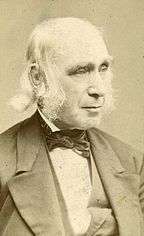
The true teacher defends his pupils against his own personal influence. He inspires self-trust. He guides their eyes from himself to the spirit that quickens him.
Amos Bronson Alcott (November 29, 1799 – March 4, 1888) was an American teacher, writer, philosopher, and reformer. As an educator, Alcott pioneered new ways of interacting with young students, focusing on a conversational style, and avoided traditional punishment. He hoped to perfect the human spirit and, to that end, advocated a vegan diet before the term was coined. He was also an abolitionist and an advocate for women's rights.
Quotes
- Cruelty stares at me from the butcher's face. I tread amidst carcasses. I am in the presence of the slain. The death-set eyes of beasts peer at me and accuse me of belonging to the race of murderers. Quartered, disembowelled creatures on suspended hooks plead with me. I feel myself dispossessed of the divinity.
- Journals, Port Washington, NY: Kennikat Press, 1938, Volume 1, p. 115.
Orphic Sayings
- Believe, youth, despite all temptations, the oracle of deity in your own bosom. ’T is the breath of God’s revelations,—the respiration of the Holy Ghost in your breast. Be faithful, not infidel, to its intuitions,—quench never its spirit,—dwell ever in its omniscience. So shall your soul be filled with light, and God be an indwelling fact,—a presence in the depths of your being.
- I. SPIRIT, 6. Oracle
- Solitude is Wisdom’s school. Attend then the lessons of your own soul; become a pupil of the wise God within you, for by his tuitions alone shall you grow into the knowledge and stature of the deities. The seraphs descend from heaven, in the solitudes of meditation, in the stillness of prayer.
- I. SPIRIT, 10. Solitude
- As the man, so his God
- From III. HOPE
- Ever present, potent, vigilant, in the breast of man, there is that which never became a party in his guilt, never consented to a wrong deed, nor performed one, but holds itself above all sin, impeccable, immaculate, immutable, the deity of the heart, the conscience of the soul, the oracle and interpreter, the judge and executor of the divine law.
- XVI. CONSCIENCE
- In the theocracy of the soul majorities do not rule. God and the saints; against them the rabble of sinners, with clamorous voices and uplifted hand, striving to silence the oracle of the private heart. Beelzebub marshals majorities. Prophets and reformers are always special enemies of his and his minions. Multitudes ever lie. Every age is a Judas, and betrays its Messiahs into the hands of the multitude. The voice of the private, not popular heart, is alone authentic.
- XVII. THEOCRACY
- There is a magic in free speaking, especially on sacred themes, most potent and resistless. It is refreshing, amidst the inane common-places bandied in pulpits and parlors, to hear a hopeful word from an earnest, upright soul. Men rally around it as to the lattice in summer heats, to inhale the breeze that flows cool and refreshing from the mountains, and invigorates their languid frames. Once heard, they feel a buoyant sense of health and hopefulness, and wonder that they should have lain sick, supine so long, when a word has power to raise them from their couch, and restore them to soundness. And once spoken, it shall never be forgotten; it charms, exalts; it visits them in dreams, and haunts them during all their wakeful hours. Great, indeed, is the delight of speech; sweet the sound of one’s bosom thought, as it returns laden with the fragrance of a brother’s approval.
- XVIII. SPEECH
- Prudence is the footprint of Wisdom.
- XXVIII. PRUDENCE
- Enduring fame is ever posthumous. The orbs of virtue and genius seldom culminate during their terrestrial periods. Slow is the growth of great names, slow the procession of excellence into arts, institutions, life. Ages alone reflect their fulness of lustre. The great not only unseal, but create the organs by which they are to be seen. Neither Socrates nor Jesus is yet visible to the world.
- LX. FAME
- The true teacher defends his pupils against his own personal influence. He inspires self-trust. He guides their eyes from himself to the spirit that quickens him. He will have no disciples. A noble artist, he has visions of excellence and revelations of beauty, which he has neither impersonated in character, nor embodied in words. His life and teachings are but studies for yet nobler ideals.
- LXXX. TEACHER
- Conceive of slaughter and flesh-eating in Eden.
- LXXXVI. CARNAGE
External links
- Amos Bronson Alcott Network
- Alcott biography on American Transcendentalism Web
- Alcott at Perspectives in American Literature
- Bronson Alcott: A glimpse at our vegetarian heritage, by Karen Iacobbo
- Bronson Alcott at Alcott house, England, and Fruitlands, New England (1842-1844) (1908) by Franklin Benjamin Sanborn
- Works by or about Amos Bronson Alcott in libraries (WorldCat catalog)
This article is issued from
Wikiquote.
The text is licensed under Creative
Commons - Attribution - Sharealike.
Additional terms may apply for the media files.